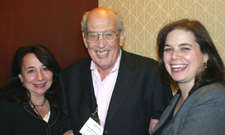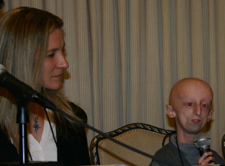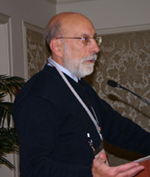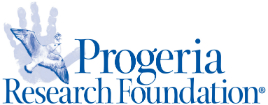2007 International Progeria Workshop Featured in Journal of Gerontology
Detailing presentations at the most recent scientific conference, this article shows how quickly the field of Progeria has advanced toward treatments and cure.
Highlights of the 2007 Progeria Research Foundation Scientific Workshop:
Progress in Translational Science. Journal of Gerontology: BIOLOGICAL SCIENCES 2008, VOL 63A, No. 8, 777-787.
 Click here to view the entire article.
Click here to view the entire article.
Copyright © The Gerontological Society of America. Reproduced by permission of the publisher.
 The organizers of PRF’s 2007 International Workshop on Progeria PRF’s Medical Director Leslie Gordon, and Medical Research Committee members Christine Harling-Berg and Frank G. Rothman have co-authored an exciting, 10-page article that appeared in the September issue of the Journal of Gerontology.
The organizers of PRF’s 2007 International Workshop on Progeria PRF’s Medical Director Leslie Gordon, and Medical Research Committee members Christine Harling-Berg and Frank G. Rothman have co-authored an exciting, 10-page article that appeared in the September issue of the Journal of Gerontology.Excerpts from the article:
…These meetings [the six workshops on Progeria since 2001] have provided a concentrated forum to facilitate the collective thinking of clinicians and scientists about Progeria, forge collaborations in this little known field, and accelerate the discovery of new ways to push the field forward towards treatments and cure…
…The essence of translational research was represented in the presentations, which brought forth the most important issues in Progeria today – the effects of progerin and lamins and their binding partners on the functioning of cells, systems, mouse models and humans; the connection between Progeria, aging and cardiovascular disease in the general population; careful analysis of FTI effects on Progeria at all levels; and strategies for future disease treatments and cure…
…The presentations, posters and discussion at the 2007 Progeria Workshop showed extraordinary progress at all levels: from basic science, mouse and human studies that better define the biological effects of progerin on disease pathogenesis and on aging and cardiovascular disease in the general population, to the first clinical drug trial for Progeria. The discovery that progerin is found in normal human fibroblasts in an age-dependent manner establishes a new link between Progeria and aging. This is the best example yet of how studies on Progeria may be valuable to understanding human aging.

During the first evening of the workshop, participants had a unique chance to hear from children with Progeria and their families during a panel discussion. Here, Sammy (12 years old from Italy) wanted to especially “…thank all the doctors and all the researchers that are putting such an effort into trying to help me out and all the other kids with the disease.”
In an accompanying editorial*, Huber R. Warner, PhD, Associate Dean for Research of the College of Biological Sciences, University of Minnesota, addresses Progeria as a model for studying accelerated aging and notes several theories for treatments, including the FTIs currently involved in the clinical drug trial, and even a cure. He concludes that the scientific data shows that Progeria does in fact have overlap with normal aging, and therefore might provide unique opportunities to increase our understanding of the biology of aging and age-dependent disease. Dr. Warner writes:
“The Progeria Research Foundation will continue to play a major role in fostering the translational research needed to find effective treatments and/or a cure for children afflicted with HGPS.”
* Research on Hutchinson-Gilford Progeria Syndrome J Gerontol A Biol Sci Med Sci. 2008;63:775-776
Copyright © The Gerontological Society of America. Reproduced by permission of the publisher.
Copyright © The Gerontological Society of America. Reproduced by permission of the publisher.
Copyright © The Gerontological Society of America. Reproduced by permission of the publisher.

A hearty thank you to all who participated in the November 2007 Progeria Research Foundation Scientific Workshop, and to all of you who helped fund this terrific event! Major sponsors were:
- The Office of Rare Diseases, National Heart, Lung and Blood Institute and The National Cancer Institute at NIH; and
- The Ellison Medical Foundation

Recent Comments